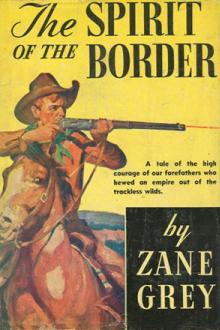The U. P. Trail, Zane Grey [robert munsch read aloud .txt] 📗

- Author: Zane Grey
Book online «The U. P. Trail, Zane Grey [robert munsch read aloud .txt] 📗». Author Zane Grey
Neale threw the cards in the man’s face; then, rising, he bent over to slap him so violently as to knock him off his chair.
The crash stilled the room. Every man turned to watch.
Neale stood up, his right arm down, menacingly. The gambler arose, cursing, but made no move to draw a weapon.
Beauty Stanton could not, to save her life, speak the words she wanted to say. Something impeding, totally unexpected, seemed to have arisen.
“Neale—come with—me!” was all she could say.
“No!” he declared, vehemently, with a gesture of disgust and anger.
That, following the coarse implication of the gambler, conveyed to Stanton what all these men imagined. The fools! The fools! A hot vibrating change occurred in her emotion, but she controlled it. Neale turned his back upon her. The crowd saw and many laughed. Stanton felt the sting of her pride, the leap of her blood. She was misunderstood, but what was that to her? As Neale stepped away she caught his arm—held him while she tried to get close to him so she could whisper. He shook her off. His face was black with anger. He held up one hand in a gesture that any woman would have understood and hated. It acted powerfully upon Beauty Stanton. Neale believed she was importuning him. To him her look, whisper, touch had meant only the same as to these coarse human animals gaping and grinning as they listened. The sweetest and best and most exalted moment she had ever known was being made bitter as gall, sickening, hateful. She must speak openly, she must make him understand.
“Allie Lee!... At my house!” burst out Stanton, and then, as if struck by lightning she grew cold, stiff-lipped.
The change in Neale was swift, terrible. Not comprehension, but passion transformed him into a gray-faced man, amazed, furious, agonized, acting in seeming righteous and passionate repudiation of a sacrilege.
“———!” His voice hurled out a heinous name, the one epithet that could inflame and burn and curl Beauty Stanton’s soul into hellish revolt. Gray as ashes, fire-eyed, he appeared about to kill her. He struck her—hard—across the mouth.
“Don’t breathe that name!”
Beauty Stanton’s fear suddenly broke. Blindly she ran out into the street. She fell once—jostled against a rail. The lights blurred; the street seemed wavering; the noise about her filtered through deadened ears; the stalking figures before her were indistinct and unreal.
“He struck me! He called me———!” she gasped. And the exaltation of the last hour vanished as if it had never been. All the passion of her stained and evil years leaped into ascendency. “Hell—hell! I’ll have him knifed—I’ll see him dying! I’ll wet my hands in his blood! I’ll spit in his face as he dies!”
So she gasped out, staggering along the street toward her house. There is no flame of hate so sudden and terrible and intense as that of the lost woman. Beauty Stanton’s blood had turned to vitriol. Men had wronged her, ruined her, dragged her down into the mire. One by one, during her dark career, the long procession of men she had known had each taken something of the good and the virtuous in her, only to leave behind something evil in exchange. She was what they had made her. Her soul was a bottomless gulf, black and bitter as the Dead Sea. Her heart was a volcano, seething, turgid, full of contending fires. Her body was a receptacle into which Benton had poured its dregs. The weight of all the iron and stone used in the construction of the great railroad was the burden upon her shoulders. These dark streams of humanity passing her in the street, these beasts of men, these hairy-breasted toilers, had found in her and her kind the strength or the incentive to endure, to build, to go on. And one of them, stupid, selfish, merciless, a man whom she had really loved, who could have made her better, to whom she had gone with only hope for him and unselfish abnegation for herself—he had put a vile interpretation upon her appeal, he had struck her before a callous crowd, he had called her the name for which there was no pardon from her class, a name that evoked all the furies and the powers of hell.
“Oh, to cut him—to torture him—to burn him alive... But it would not be enough!” she panted.
And into the mind that had been lately fixed in happy consciousness of her power of good there flashed a thousand scintillating, corruscating gleams of evil thought. And then came a crowning one, an inspiration straight from hell.
“By God! I’ll make of Allie Lee the thing I am! The thing he struck—the thing he named!”
The woman in Beauty Stanton ceased to be. All that breathed, in that hour, was what men had made her. Revenge, only a word! Murder, nothing! Life, an implacable, inexplicable, impossible flux and reflux of human passion! Reason, intelligence, nobility, love, womanhood, motherhood—all the heritage of her sex—had been warped by false and abnormal and terrible strains upon her physical and emotional life. No tigress, no cannibal, no savage, no man, no living creature except a woman of grace who knew how far she had fallen could have been capable of Beauty Stanton’s deadly and immutable passion to destroy. Thus life and nature avenged her. Her hate was immeasurable. She who could have walked naked and smiling down the streets of Benton or out upon the barren desert to die for the man she loved had in her the inconceivable and mysterious passion of the fallen woman; she could become a flame, a scourge, a fatal wind, a devastation. She was fire to man; to her own sex, ice. Stanton reached her house and entered. Festivities in honor of the last night of Benton were already riotously in order. She placed herself well back in the shadow and watched the wide door.
“The first man who enters I’ll give him this key!” she hissed.
She was unsteady on her feet. All her frame quivered. The lights in the hall seemed to have a reddish tinge. She watched. Several men passed out. Then a tall, stalking form appeared, entering.
A ball of fire in Stanton’s breast leaped and burst. She had recognized in that entering form the wildest, the most violent and the most dangerous man in Benton—Larry Red King.
Stanton stepped forward and for the first time in the cowboy’s presence she did not experience that singular chill of gloom which he was wont to inspire in her.
Her eyes gloated over King. Tall, lean, graceful, easy, with his flushed ruddy face and his flashing blue eyes and the upstanding red hair, he looked exactly what he was—a handsome red devil, fearing no man or thing, hell-bent in his cool, reckless wildness.
He appeared to be half-drunk. Stanton was trained to read the faces of men who entered there; and what she saw in King’s added the last and crowning throb of joy to her hate. If she had been given her pick of the devils in Benton she would have selected this stalking, gun-packing cowboy.
“Larry, I’ve a new girl here,” she said. “Come.”
“Evenin’, Miss—Stanton,” he drawled. He puffed slightly, after the manner of men under





Comments (0)